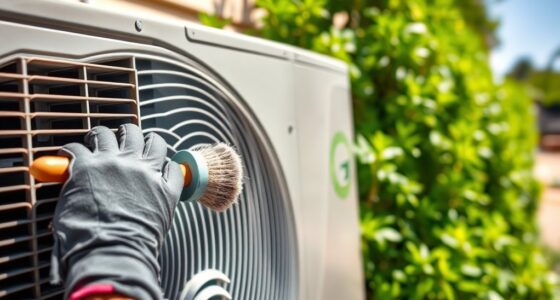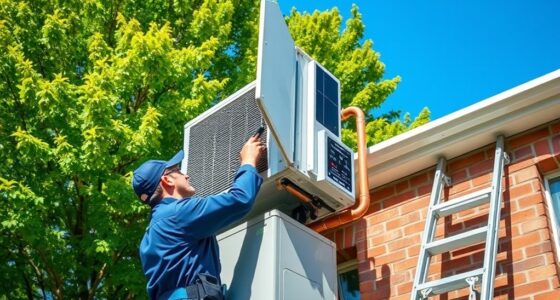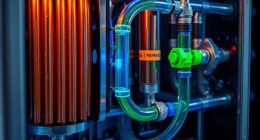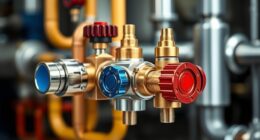We provide detailed insights on the six main costs associated with installing and maintaining heat pumps. Understanding the financial considerations of implementing this energy-efficient heating and cooling solution is crucial for homeowners and business owners alike.
From the initial installation costs to ongoing maintenance and repairs, we’ll break down all the expenses you need to consider.
So, let’s dive in and uncover the true costs of heat pump ownership.
Key Takeaways
- Conducting a cost benefit analysis is essential to determine the return on investment of heat pump installation.
- The upfront costs of purchasing and delivering the heat pump unit should be considered, along with the costs of obtaining permits and inspections.
- The cost of labor, materials, and modifications to the existing heating system should be factored in.
- Additional equipment expenses, such as a backup generator or new electrical panel, may be necessary.
Initial Installation Costs
We can expect to incur several expenses during the initial installation of heat pumps.

It’s important to conduct a cost benefit analysis to determine the return on investment for this project.
The first cost to consider is the purchase and delivery of the heat pump unit itself.
Additionally, there may be costs associated with obtaining the necessary permits and inspections from local authorities.
Installation costs include labor, materials, and any necessary modifications to the existing heating system.

It’s also important to factor in the cost of any additional equipment, such as a backup generator or a new electrical panel, if needed.
Equipment and Material Expenses
Our budget for installing and maintaining heat pumps will need to account for expenses related to equipment and materials. When it comes to equipment, it is important to consider the upfront costs as well as the long-term benefits. Investing in high-quality heat pump equipment will not only ensure optimal performance but also reduce the need for frequent repairs and replacements. It is advisable to choose equipment that comes with reliable warranties to protect your investment. Additionally, focusing on energy efficiency can help save on operating costs in the long run. By selecting heat pumps with high energy efficiency ratings, you can reduce your energy consumption and lower your utility bills.
| Equipment | Cost Range |
|---|---|
| Heat Pump | $2,000 – $8,000 |
| Ductwork | $1,000 – $5,000 |
| Thermostat | $100 – $300 |
| Insulation | $500 – $2,000 |
| Miscellaneous Materials | $200 – $500 |
Table 1: Equipment and Material Expenses for Heat Pump Installation.
Professional Labor Charges
They are responsible for determining the cost of the professional labor charges for installing and maintaining heat pumps. Professional labor charges are an important aspect to consider when budgeting for heat pump installation and maintenance.

Here are three key factors that contribute to the cost of professional labor charges:
Professional Training: Skilled technicians with specialized training in heat pump installation and maintenance are essential for ensuring a proper and efficient installation. The cost of their professional training and expertise is reflected in the labor charges.
Warranty Coverage: A reputable HVAC contractor will offer warranty coverage for their workmanship. This ensures that any issues arising from the installation or maintenance will be addressed by the professionals without additional cost to the homeowner.
Efficiency and Expertise: Hiring professionals with experience in heat pump installation and maintenance guarantees a high level of efficiency and expertise. Their knowledge of the latest industry standards and best practices ensures a smooth and reliable installation process.

Considering these factors, it’s important to budget for professional labor charges to ensure a successful heat pump installation or maintenance. This is essential for the long-term performance and efficiency of the system.
Now, let’s move on to discuss the next aspect of heat pump costs: permit and inspection fees.
Permit and Inspection Fees
Before beginning the installation or maintenance of a heat pump, it’s important to consider the costs associated with permit and inspection fees. These fees are necessary to ensure compliance with permit requirements and regulatory standards.
Permit requirements vary depending on your location, but in general, they involve obtaining approval from local authorities to proceed with the installation or maintenance of a heat pump. This process may require submitting documentation, such as plans and specifications, and paying a fee for the permit.

Additionally, inspections may be required at different stages of the project to ensure that the work is being done correctly and in accordance with safety regulations. These permit and inspection fees are essential to ensure that the heat pump installation or maintenance is done properly and safely.
Moving forward, let’s now delve into the next section about the ongoing maintenance and repairs.
Ongoing Maintenance and Repairs
When it comes to ongoing maintenance and repairs for heat pumps, there are several key points to consider.
Firstly, the cost of repairs can vary depending on the type and extent of the issue, with potential expenses ranging from minor part replacements to major system repairs.

Secondly, regular maintenance expenses, such as filter replacement and system inspections, are necessary to keep the heat pump running efficiently and prevent costly breakdowns.
Lastly, investing in long-term maintenance, such as annual service contracts or extended warranties, can provide added peace of mind and potentially save money in the long run.
Cost of Repairs
We need to consider the cost of ongoing maintenance and repairs when installing and maintaining heat pumps. It’s important to account for potential repair expenses to ensure that the overall cost of ownership remains manageable.
Here are three key factors to consider when evaluating the cost of repairs for heat pumps:

Cost of Replacement: Heat pumps have a lifespan of approximately 15-20 years. As the unit ages, the likelihood of component failures increases. It’s essential to factor in the potential cost of replacing major components or even the entire system when budgeting for repairs.
Warranty Coverage: Many heat pump manufacturers offer warranties that cover certain repairs and replacements within a specified period. Understanding the terms and conditions of the warranty can help you gauge the potential out-of-pocket expenses for repairs.
Regular Maintenance: Proper maintenance can help mitigate the risk of costly repairs. Regularly cleaning and servicing the heat pump can prevent issues from escalating and prolong the lifespan of the system, reducing the need for extensive repairs.
Regular Maintenance Expenses
As homeowners, we must be aware of the ongoing maintenance and repair costs associated with heat pumps in order to properly budget for them. Regular maintenance is essential to ensure the optimal performance and longevity of your heat pump.

A regular maintenance schedule should be followed, which includes tasks such as cleaning or replacing filters, inspecting and cleaning coils, and checking refrigerant levels. These preventative maintenance measures help prevent costly repairs and keep your heat pump running efficiently.
It’s also recommended to have a professional technician perform a thorough inspection and tune-up of your heat pump at least once a year. This will help identify any potential issues before they escalate into major problems.
Long-Term Maintenance Investment
Our long-term maintenance investment includes ongoing maintenance and repairs to ensure the continued efficiency and reliability of our heat pump. By investing in regular maintenance, we can reap the long-term benefits that contribute to a higher return on investment.
Here are three reasons why long-term maintenance is crucial for your heat pump:
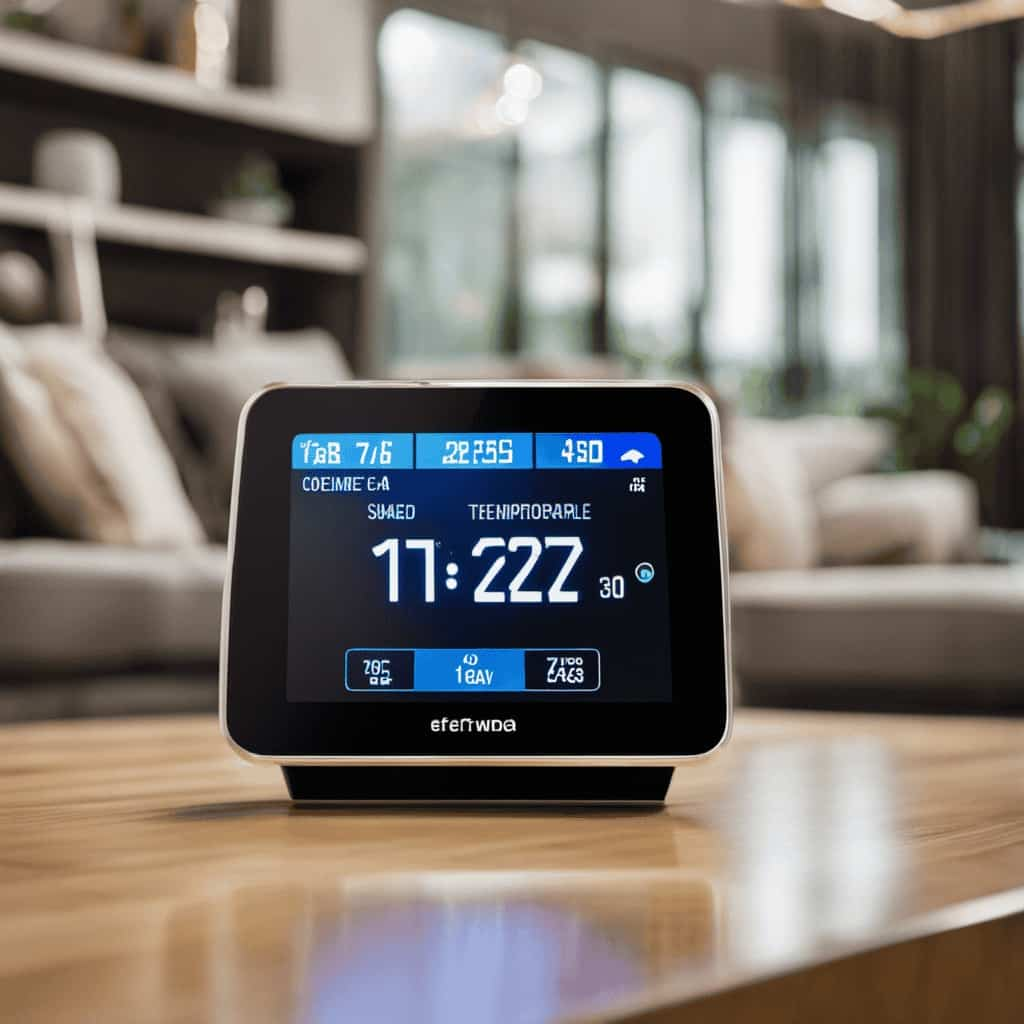
Increased Efficiency: Regular maintenance ensures that your heat pump operates at its optimal efficiency, reducing energy consumption and utility costs. By keeping the system clean and well-maintained, it can perform at its highest efficiency, saving you money on your energy bills.
Extended Lifespan: Proper maintenance helps to extend the lifespan of your heat pump. By addressing any potential issues early on and performing necessary repairs, you can avoid costly breakdowns and premature replacements. This ultimately contributes to a higher return on investment by maximizing the lifespan of your heat pump.
Enhanced Reliability: With ongoing maintenance, you can minimize the risk of unexpected breakdowns and ensure that your heat pump operates reliably throughout its lifespan. By regularly inspecting and servicing the system, you can identify and address any potential issues, keeping your heat pump running smoothly.
Investing in long-term maintenance for your heat pump not only brings numerous benefits but also helps you save on energy consumption and utility costs. Now, let’s delve into the next section, which discusses the impact of heat pump systems on energy consumption and utility costs.

Energy Consumption and Utility Costs
When it comes to energy consumption and utility costs, one of the key considerations is the efficiency of the heat pump. Heat pumps that are more efficient can help reduce energy consumption, leading to lower utility costs.
Additionally, peak demand charges can also impact utility costs, as these charges are based on the highest amount of power used during a specific period.
Understanding these factors can help homeowners make informed decisions about heat pump installation and usage to optimize energy efficiency and minimize utility costs.
Efficiency and Cost Savings
While heat pumps can provide efficient heating and cooling, they can also lead to significant cost savings on energy consumption and utility bills. Here are three ways in which heat pumps can improve efficiency and save you money:
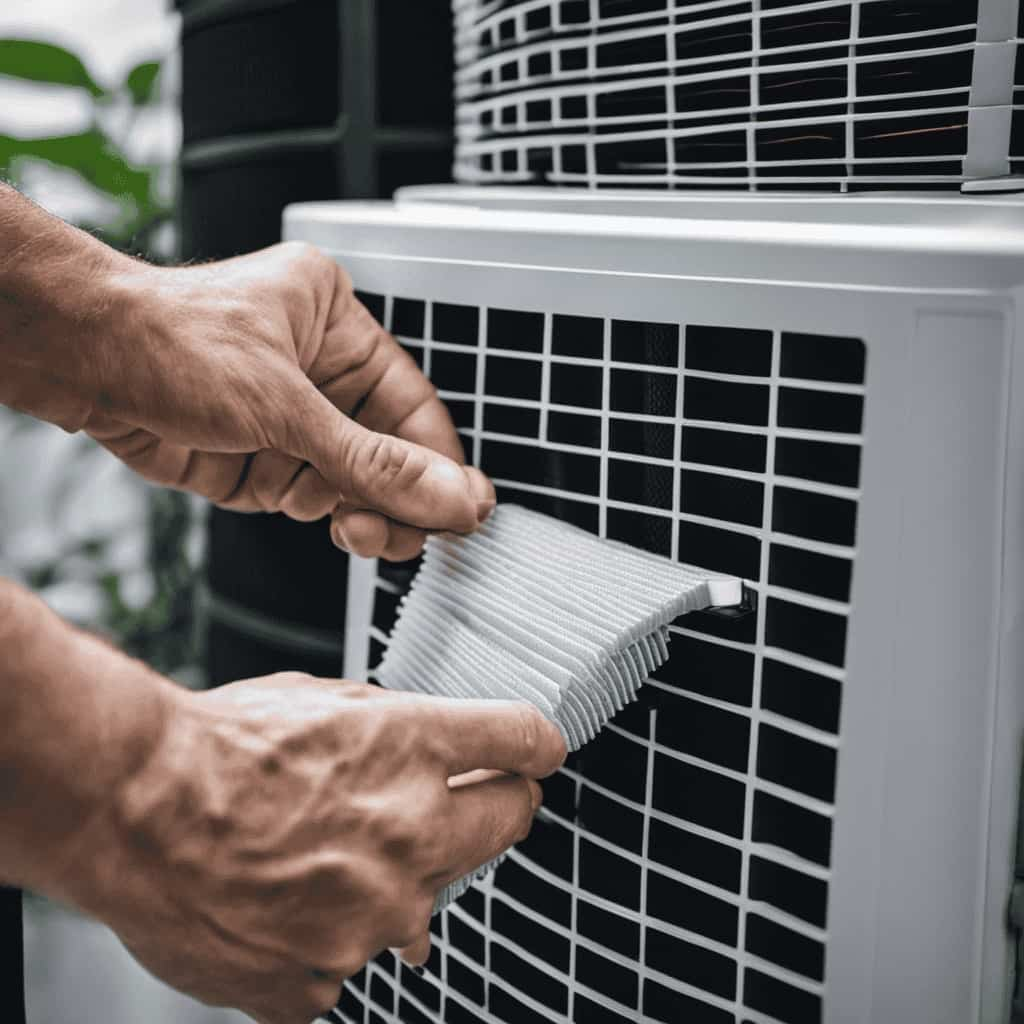
Energy Efficiency: Heat pumps are highly energy efficient, as they transfer heat from one location to another instead of generating it. This means that they require less energy to operate and can reduce your overall energy consumption.
Lower Utility Costs: By using less energy, heat pumps can help lower your utility bills. Compared to traditional heating and cooling systems, heat pumps can provide cost savings of up to 50% on your energy bills.
Environmental Impact: Heat pumps have a lower carbon footprint compared to other heating and cooling options. By reducing energy consumption, they contribute to a more sustainable and environmentally friendly future.
Investing in a heat pump not only provides efficient heating and cooling but also offers long-term cost savings and benefits for the environment.
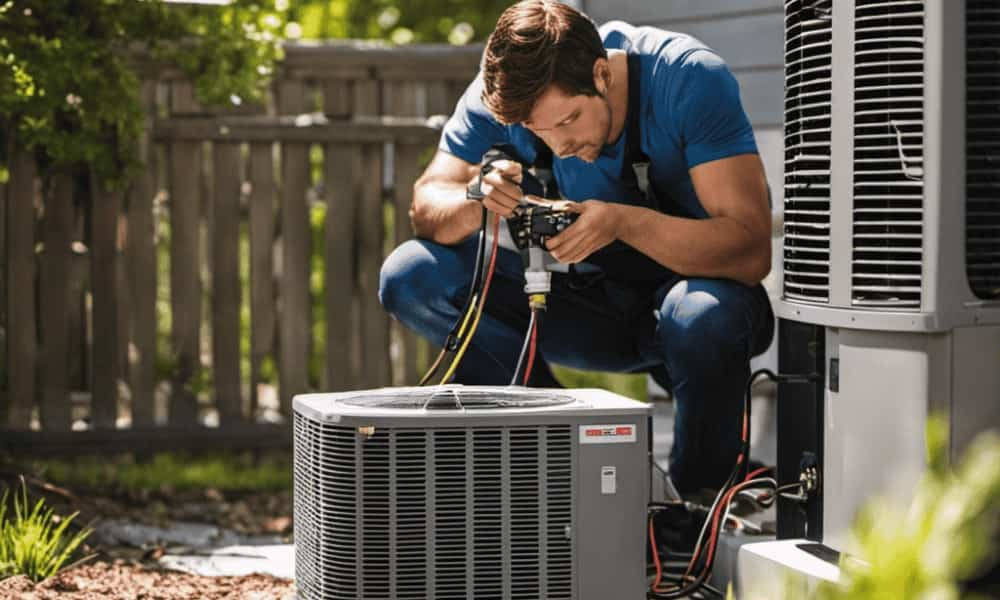
Peak Demand Charges
The peak demand charges can significantly impact our energy consumption and utility costs when using heat pumps.
Peak demand charges are fees imposed by utility companies to offset the cost of supplying electricity during periods of high demand.
When using heat pumps, there can be a surge in electricity consumption during peak demand periods, which can result in higher utility costs.
To reduce these costs, it’s important to consider the efficiency of heat pumps and their ability to mitigate peak demand.

By opting for heat pumps that use renewable energy sources, such as solar or geothermal energy, we can reduce our reliance on the grid during peak demand periods.
This not only helps to lower electricity consumption but also contributes to a more sustainable and environmentally friendly energy system.
Frequently Asked Questions
Are There Any Tax Credits or Incentives Available for Installing a Heat Pump?
Yes, there are tax incentives available for installing a heat pump. Eligibility requirements vary, but homeowners may qualify for credits that help offset the cost of installation. These incentives can significantly reduce upfront expenses.
How Long Does the Average Heat Pump Last Before It Needs to Be Replaced?
The average heat pump lasts around 15-20 years before it needs replacement. Signs of a failing heat pump include decreased efficiency, frequent repairs, and uneven heating/cooling. Regular maintenance can help extend its lifespan.

Can a Heat Pump Be Used as the Sole Source of Heating and Cooling in a Home?
A heat pump can be used as the sole source of heating and cooling in a home. Pros include energy efficiency compared to traditional HVAC systems. Cons may include higher upfront costs and potential limitations in extreme climates.
Are There Any Additional Costs Associated With Upgrading Electrical Systems to Accommodate a Heat Pump?
When upgrading electrical systems for a heat pump, there are cost implications, installation challenges, and energy efficiency to consider. Professional installation ensures proper heat pump sizing and compatibility with existing HVAC systems. Potential rebates and incentives, long term savings, and environmental impact should also be evaluated. Financing options, noise levels, warranty coverage, and heat pump performance in extreme temperatures are important factors. Technicians should have proper training and certification. Resale value may be impacted.
How Often Should a Heat Pump Be Serviced and What Is the Typical Cost of Maintenance?
Heat pumps should be serviced annually to ensure optimal performance. The average cost of maintenance ranges from $100 to $300. Regular servicing helps prevent breakdowns and extends the lifespan of the heat pump.
What Are the Average Costs of Heat Pump Installation and Maintenance?
The heat pump installation and maintenance costs can vary depending on factors like the system size, type, and location. On average, installation costs range from $3,000 to $8,000. Yearly maintenance expenses can amount to around $150 to $300. It’s always recommended to get multiple quotes from reliable contractors to ensure competitive pricing.
Conclusion
In conclusion, it’s important to consider the various costs associated with installing and maintaining heat pumps.

One interesting statistic to note is that ongoing maintenance and repairs can account for up to 20% of the total cost of owning a heat pump system. This highlights the significance of regular maintenance to ensure the longevity and efficiency of the system, ultimately saving on future repair expenses.
By being aware of these costs, homeowners can make informed decisions when it comes to investing in heat pumps for their homes.



